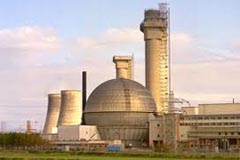South Down MP Margaret Ritchie made a strong attack on the safety record of Sellafield nuclear plant in Cumbria.
She responded to the safety breaches exposed by the BBC’s Panorama documentary on nuclear waste management at Sellafield shown on TV last night (Monday 5 September 2016).

Ms Ritchie said: “Panorama has done vital work in exposing the safety failures at Sellafield, including staff shortages and the storing of radioactive materials in ‘degrading plastic bottles.’ I pay tribute to both the documentary makers and the whistle blowers who have exposed these dangers.
“However, the risks exposed by Panorama are only the latest in a litany of hazards that have been clear since Sellafield was established as a nuclear waste processing site.
“It has always been needlessly reckless to place a nuclear waste processing site on a geological fault line, and the indiscriminate discharge of radioactive material into the waters of the Irish Sea has damaged delicate marine ecosystems. That is why I and the SDLP have consistently opposed the transportation of nuclear waste to Sellafield by air, sea or land.
“In light of these most recent revelations, we must see an acceleration of the nuclear decommissioning process and the establishment of secure, long-term containment strategy for the existing nuclear waste sitting in Sellafield.
“The Government must also learn from these hazards and avoid worsening the situation with new nuclear developments at Moorside and Hinkley Point C. Nuclear waste is a toxic burden that lasts for generations and cannot ever be part of a truly sustainable electric grid.”
Ritchie Questions Minister On Sellafield Dangers
SDLP South Down MP Margaret Ritchie has questioned the Minister for Climate Change and Industry in Parliament on the safety failings exposed by the BBC’s Panorama documentary.
She said: “Like many of my constituents, I am deeply concerned by the safety failings exposed by yesterday’s Panorama documentary. The Minister stated that his job today was to provide reassurance to the public on safety at Sellafield. Unfortunately, having listened to his statement and answers, I have not been reassured that the Government is responding to the issues raised with the seriousness required.
“Rather than waving away the issues raised by the documentary, the Minister must work with the Nuclear Decommissioning Authority to accelerate the decommissioning of nuclear waste, and urgently working to establish a secure, deep-level geological storage site away from Sellafield.
“I suspect that the Government is hoping for this issue will fall off the radar as the news cycle moves on, but the dangers of nuclear waste are too great to allow this to happen. This is why I will continue working in Parliament to hold the Government to account on the safety of the nuclear waste at Sellafield and its impact on communities on both sides of the Irish Sea.”
***
 The Panorama programme documented a series of very graphic images of infrastructure that looked beyond its use-by date. Speaking to a whistleblower, Panorama uncovered a series of potential disasters waiting to happen, but management at Sellafield were very laid back implying everything was safe and under control albeit acknowledging there were some ‘issues’.
The Panorama programme documented a series of very graphic images of infrastructure that looked beyond its use-by date. Speaking to a whistleblower, Panorama uncovered a series of potential disasters waiting to happen, but management at Sellafield were very laid back implying everything was safe and under control albeit acknowledging there were some ‘issues’.
One pond which contained material including sludge contaminated with radioactivity was understood to have “hundreds” of small cracks which were described as slight seepage of “liquor”. The pond had experienced severe degradation and fears of a major collapse leading to a major incident were flagged up but described by the Sellafield managers as a very low possibility of happening. The possibility of a fire was described as very extreme in the ponds, and the radioactive material had to be immersed in water continuously.
Several silos with contaminated radioactive waste too were described as an “intolerable risk” by management.
And the 50-year old Magnox processing plant too has to keep running in case there is a build up of radioactive material.
It was said that a fire in a silo would cause a plume of smoke that would cross western Europe. It is now feared that Sellafield is in a very poor state and may need immediate and very costly intervention to ensure that it is safe for years to come.
(Check out Spotlight on BBC this evening (Tuesday 6 September 2016.)


























